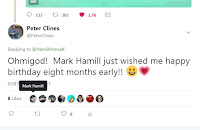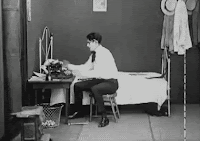Happy Birthday to me. Well, belated birthday. Monday was a day of action figures and LEGO sets and many games and drinks with my fully vaxxed friends. It was a wonderful way to turn <<–DC REBOOT–>> years old.
Anyway… now that I am somewhat old and wise, I wanted to take a moment to blather on about something that’s been itching at my brain for a while. And I know it’s going to be a touchy subject for some people, so I’ll try to tread lightly.
MFA programs. Why do these things even exist?
See! I told you it’d be touchy! Just to be clear right up front, this is absolutely not a swing at anyone who made it through an MFA program and got a degree. I know MFA writers are popular punching bags for some people, and this is not one of those posts. I’m a huge believer that pretty much all education ends up being useful (even if not always in the way it was intended) and I’ve got massive respect for anyone who actually did it. I enjoyed my four years at UMass, but I also know I wouldn’t’ve had the stamina (or the resources) to make a graduate degree happen. So this is, again, not coming down on anyone who scraped and clawed their way up through a higher level of higher education and came out on top.
You absolutely rock. Seriously. Never doubt it.
The people who gave you that MFA though…
Probably a good point to mention before I get going is none of this has been triple-checked or peer reviewed or anything like that. But within my own experience–including a degree of research specifically about this–I haven’t found anything to contradict any of it. Like, a disturbing number of things line up with this half-assed theory I’m about to present to you.
So… one of the main reasons writers and other artists tend to get the liberal/ fruity/ beatnik type labels is because, traditionally, if I wanted to learn one of these fields I just did it. People didn’t go to school to learn how to write, they just wrote. They dropped out of “productive society” and wrote a lot. For the vast majority of folks this meant finding a dirt-cheap apartment in a city close to publishers (to save postage costs), drinking cheap booze, having cheap affairs, and skipping two meals a day to pay for supplies. Eventually (hopefully) I learned from experience, got better, and then people started to pay me. That’s where the stereotype of the starving artist comes from—most of these folks went hungry while they learned their art. I talked about this at length a few birthdays back…
Yeah, if I was really lucky I might find some kind of mentor to show me how to hold a brush, where to hit the marble with the chisel, or to read the first half page of my story and offer a dozen notes right there. But these were kinda few and far-between. I mean, think about it. In terms of any general population (pick your favorite city or state or country) there are only going to be so many successful artists. So out of that limited number, I need to actually find one of them, and it needs to be someone in the field I want to study, and they need to be willing to offer some sort of mentorship, AND they need to have space/ time for me, personally. I mean, there’s probably hundreds of other people looking for mentors too, right? It absolutely happened, no question… but it probably didn’t happen a lot, just applying a little common sense.
Now the reason people had to learn this way is universities and colleges didn’t teach the arts. No painting or dance or acting or writing. Really. They were professional institutions. People went there to learn engineering, medicine, chemistry, law. You know… real jobs.
Worth noting there were a very small number of these schools with writing classes. But even in those cases this wasn’t something you got a degree in. It was just a side thing—some exercises to maybe help you write a better closing speech for the jury.
And yes, I know—there were a few specialist art school out there. Very few, comparatively speaking. The odd music academy or dance conservatory. But this wasn’t considered higher education. It was—at best—more like we’d consider a vocational school. And if you think about it, that kind of makes sense. Sure I can teach you how to write notation for sheet music and how to blow on a flute. But I can’t teach you how to compose the song in your head. And as we’ve talked about here many, many times, somebody can’t teach you the “correct” way for you to write. We all need to figure that out for ourselves.
So what changed? How did writing (and the other arts) suddenly become a “teachable” thing? Well, two things happened. Actually, one thing happened, but a second thing had a very powerful impact on that first one.
In reverse order, the second one was Nazis. Hate those guys, right? In case you missed that week of grade school history, in the mid-late 1930s a right-wing fascist group gained a ton of power in Germany and made life miserable for pretty much everyone in Europe. And a lot of people in Africa. And Asia. Eventually the US joined in the fight (to quote Eddie Izzard, “after a couple of years, we won’t stand for that anymore!”) and sent sixteen million people off to fight.
After WWII, a lot of folks—like with WWI before it—were just left wrecked by the scale of it all. The things they’d done. The things they’d seen. I mean, by the numbers, the odds were you saw someone die every single day. For maybe four years. So when the war ended, most US servicemen got a slow boat home. A deliberately slow boat. So these soldiers had time to breathe, to look at the waves, and to talk. Most importantly, to do it with a bunch of people who’d just gone through the same things they did.
And when they got home, that first thing I mentioned was waiting for them.
Y’see, the US Government had come up with something called the GI Bill. WWI (and its aftermath) was still fresh in a lot of folks’ minds and everybody wanted to make sure this new wave of veterans were taken care of when they came home. So the government said “When you finish your tour, go to college on us! We’ll cover it.” Because it was a win-win for the United States. We’re taking care of veterans and we’re making more doctors, engineers, and scientists. Wooo! Yay us! We rock!
So these guys got home, Big Government pulled out the big checkbook and said “Congrats on surviving–what college do you want to go to? What do you want to study? Law? Medicine? Rocket science? We’re going to need some more rocket scientists pretty soon.”
And a lot of guys took that offer. But a bunch of them said “Y’know… I think I might just take a year or three off and process all this some more. Work through it. Maybe write a book or some poetry, put some of this stuff in my head down on the page while I try to figure out what I’m doing next.”
Now this wasn’t the first time Uncle Sam had heard something like this (again, WWI just thirty years earlier). So he shoved the checkbook back in his pocket, put a firm hand on their collective shoulders and said “Good on you, man. You go do what you need to do to get right.”
And that would’ve been it. Except… suddenly the collective colleges and universities of America said “Whoa, whoa, WHOA! You promised us all this GI Bill money! You said hundreds of thousands of soldiers were going to be signing up for college!”
”Yeah,” said Big Government, “but they don’t want to be doctors or lawyers now. They just want to write a book about their experiences.”
”Well, let’s not be hasty,” said the CEO of Colleges, Inc. “I mean we… we’ve got writing… programs.”
“You do?”
“Oh, yeah. Yeah. A whole department. Several departments. They could absolutely get a degree in… in the arts. In fine arts, even! You just write those checks, Big Uncle Sammy, we’ll have everything ready by September.”
Worth noting my friend M.L. Brennan (college professor and vampire author) heard this line of thought from me a while back and pointed out all of this continued (arguably got a lot worse) in the ‘90s when college loans became a serious for-profit business. Higher education became less about, well, education and more about making money. So it’s not surprising MFA programs multiplied like bunnies shortly after that. You want to go to college for what? Yeah, sure, we’ve got a program for that. Just sign your loan papers…
And that’s how writing became something that’s taught. Colleges and universities just wanted the money. Which also meant now they needed to make up rules and guidelines and formulas to try to teach all these things. Because if there weren’t any rules, they wouldn’t be able to issue grades. Some students couldn’t do better than others. Which would mean this “degree” I got is… well, kinda pointless. Maybe even worthless.
Which brings us to the last thing I’m going to say about MFA programs—their abysmal success rate. Seriously. For most college degrees (of any level), we say “making a living at it” is more or less the end goal of getting the degree. If I go to school to be, say, a high school teacher, and 83% of us in that program become high school teachers, that’s a pretty successful program, right?
With that in mind, as another friend, Kristi Charish, has pointed out…what would you think of a school where less than 5% of education graduates end up making a living as teachers? What could we say about an engineering program where only one or two students out of the entire graduating class actually become engineers?
I mean… seriously, does that sound like a successful program? A terribly useful degree? Especially if there are dozens of other people becoming successful teachers or engineers without that degree? I mean, Kristi told me at her school the science department had produced more successful novelists than the MFA program.
And again, I want to stress, this isn’t about the people who got those degrees. As I said at the start of this, I’m impressed by anyone who makes it through a graduate program. And I absolutely think some useful learning comes out of it.
But if someone’s about to make that choice, I’ve got to be honest… I’d tell them it’s probably not worth it. They might get something out of it, yeah, but odds are they could get that thing somewhere else. Probably a lot easier and definitely a lot cheaper.
Also again… none of this has been rigorously reviewed. There could very well be a dozen facts I missed just sitting out there, ready to tear this whole chain of thought apart brick by brick. And if so, please give me those facts. I’m always glad to know more.
Next time… I want to talk about the story that happens five years later. Or really, the opening that happened five years ago.
Until then, go write.
















